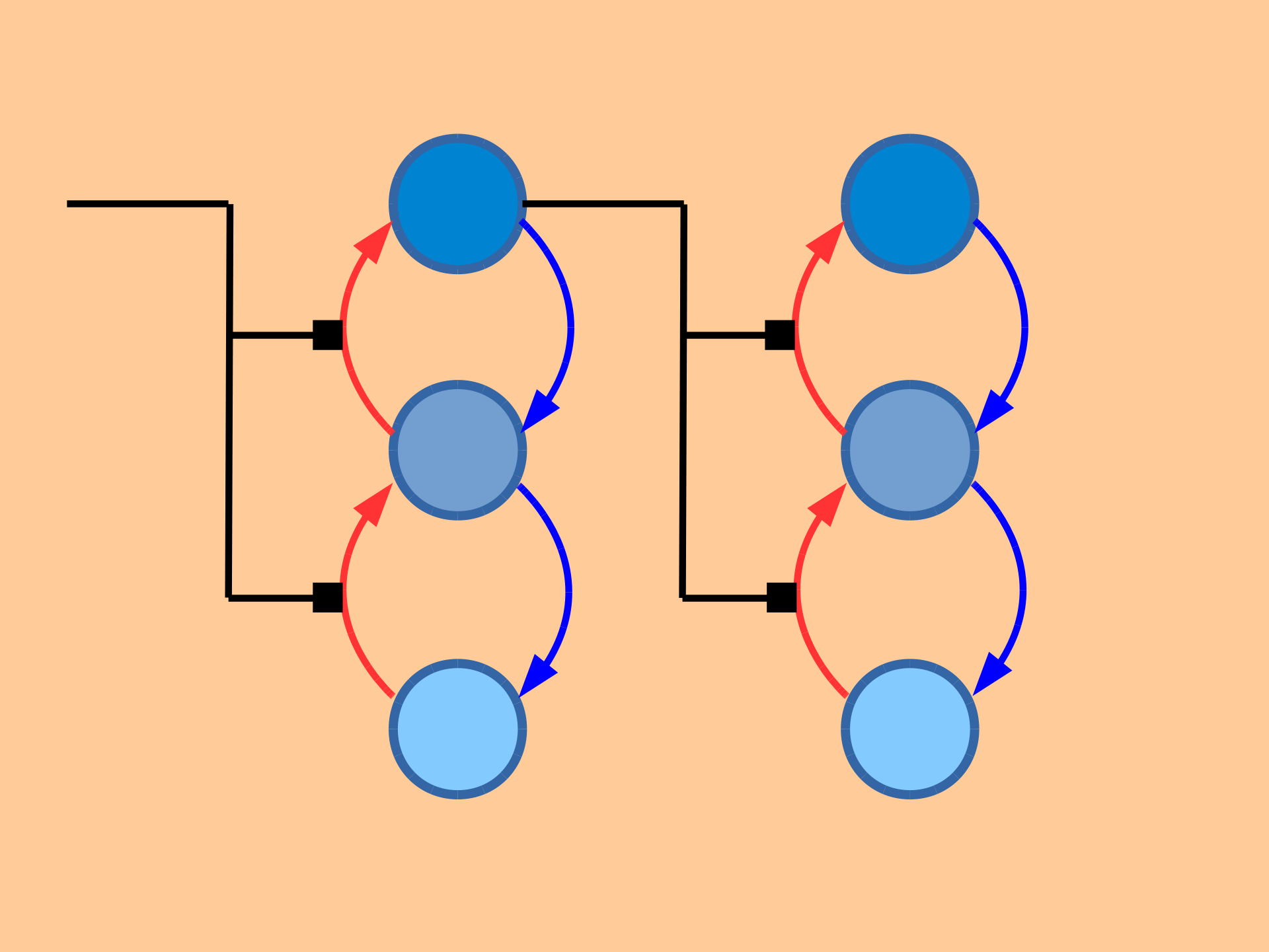
University of Udine
Systems Biology Group
Mission:
establishing communication and cooperations among different
disciplines including biology, medicine, mathematics, physics,
engineering, computer science....
Anyone is welcome.
In a coffee-talk deep concepts are explained in a simple way.
List
of Coffee-Talks
Franco Blanchini, February, 26, 2021, h. 14.00: “Mathematics as a language to understand mechanisms”.
Francesco Danuso, March, 12, 2021, h. 14.00: “How can I represent a dynamic system? … I create an ontology”.
Christian Marchioli, March, 12, 2021, h. 14.20: “Host-to-Host Airborne Transmission of Pathogens: A Fluid Mechanics Perspective.
Francesco Nazzi, Dimitri Breda, March, 26, 2021, h. 14.00-14.40: “Beestability. An adventurous journey on the edge between biology and mathematics”.
Marisa Manzano, “Biosensors in food analysis”, April, 9, 2021, h. 09.00-09.20.
Michela Maifreni, “Bacteria and Surfaces: a "sticky" topic”, April, 9, 2021, h. 09.20-09.40.
Alessio Matiz, “Study of a group of two or more people engaged in an attention task”, April, 23, 2021, h. 14.00-14.20.
Davide Anchisi, “Electrodermal responses: two (un-)congruent witnesses of emotions”, April, 23, 2021, h. 14.20-14.40.
Pierpaolo Palestri, May, 7, 2021, h. 14.00-14.20, “Convergence between electronics and biology”.
Federico Fontana, May, 7, 2021, h. 14.20-14.40, “Temporal granularity in biological network oscillations. The circadian rhythm case”.
Mara Stecchini, May, 21, 2021, h. 14.00-14.20,“A "pinch" of predictive microbiology in food”.
Laura Zanin, May, 21, 2021, h. 14.20-14.40,“From soil to roots: plant strategies for nutrient acquisition”.
Fabio Marroni, June, 18, 2021. h. 14.00-14.20, “Integration of metagenomics and transcriptonic data in grapevine”.
Elisa Scarsella, June, 18, 2021. h. 14.20-14.40, “Learning machine approach reveals microbial signatures of diet and sex in dog”.
Dimitri Breda, July, 02, 2021. h. 14.00-14.20, “A coffee at CDLab: chatting about dynamic systems”.
Francesca Scarabel, July, 02, 2021. h. 14.20-14.40, “An introduction to the strengths and challenges of physiologically structured population models with examples from epidemiology”.
Alfredo Soldati, July, 16, 2021. h. 14.00-14.20, “Short-range exposure to airborne virus transmission and current guidelines”.
Elisa Franco, July, 16, 2021. h. 14.20-14.40, “DNA nanotechnology”.
Bruno Grassi, October, 29, 2021. h. 16.30-16.50, “Oxygen transport and utilization from ambient air to skeletal muscle mitochondria: the need for a quantitative approach”.
Francesco Danuso, November, 12, 2021, h. 16.30-16.50, “The concept of "parameter" in a dynamic system”.
Alessandro Peressotti, November, 26, 2021, h. 16.30 16.50, “Plants, energy and climate change: strong or weak nexus?”.
Davide Anchisi, November, 26, 2021, h. 16.70 17.10, “Pain as a necessary illusion. A probabilistic account of nociception”.
Giuseppe De Nicolao, February, 04, 2022, h. 14.30, “The covid pandemic: an engineer's view”.
Daniele Casagrande, February, 25, 2022, h. 14.30, “Curiosities about feedback control”.
Isabella Velicogna, March, 25, 2022, h. 14.30,“Towards a learning algorithm for forecasting extreme climate events and their impact on agriculture and society”.
Lorenzo Freddi, May, 26, 2022, h. 14.30,“Optimal control of epidemics: non-pharmaceutical strategies”.
Bruno Stefanon, June, 17, 2022, h. 14.30,“Intercellular communication: Microvescicles and Exosomes”.
Federico Fontana, July, 01, 2022, h. 14.30,“Nature faces spectral analysis: the cochlea case”.
Nicole Salvatori, September, 16, 2022, h. 14.30,“Light induced electric potential differences in plants”.
Francesco Danuso, October, 07, 2022, h. 14.30: “Stochastic Climate Models ”.
Fabio Marroni, February, 03, 2023, h. 14.30: “Beyond allele-specific expression: in search for a model for determining relative expression of haplotypes in a population”.
Emanuele De Paoli, March, 03, 2023, h. 14.30: “The oven that baffled radiotelescopes and similar lessons from molecular biology”.
Expertise
and interests of groups/people
Claudio Brancolini: Epigenomic regulation of cell fate decisions.
Davide Anchisi: Probabilistic modelling of perception and learning.
Dimitri Breda: dynamic systems, numerical methods, biological models.
Emiliano Dalla: bioinformatics, functional and structural genomics, transcriptional regulation, cancer genomic.
Federico Fontana: digital filter networks.
Francesco Danuso: dynamic systems, continuous and discrete event simulation, agent based models, development of modelling frameworks, calibration and optimization, stochastic climate models, agroecosystem modellng, pharmacokinetics and physiological modeling, models of insects, ticks and plant diseases.
Francesco Nazzi: biology of bees and biological modeling.
Franco Blanchini: dynamic systems, control theory, biological models, differential equations, biochemical networks, dynamical networks.
Gianluca Tell: molecular Biology and DNA repair.
Gian Luca Colussi : cardiovascular physiology and physio-pathology.
Guglielmo Feltrin: ordinary differential equations, dynamical systems, ecological models.
Lorenzo Freddi: variational calculus and optimal control, epidemic control.
Marisa Manzano, Michela Maifreni, Marilena Marino: bacterial growth, bacterial metabolite's production, Microbial behavior in systems with stress growth conditions (sessile and planktonic cells), Pathogen diagnostics with biosensors and molecular biology.
Rachele Falchi: Development and production of fruit crops; molecular, genetic and physiological control of fruit quality
RossanaVermiglio: dynamic systems, numerical methods, biological models.
Suggested readings
Uri Alon, An Introduction to Systems Biology: Design Principles of Biological Circuits, (Chapman & Hall/CRC Computational Biology Series) 2nd Edition, (suggested by Franco Blanchini)
Jasmmin Fisher & Thomas A Henzinger, Executable Cell Biology (review) Computational Biology, Vol. 25, no. 11, 2007, (suggested by Marino Miculan)